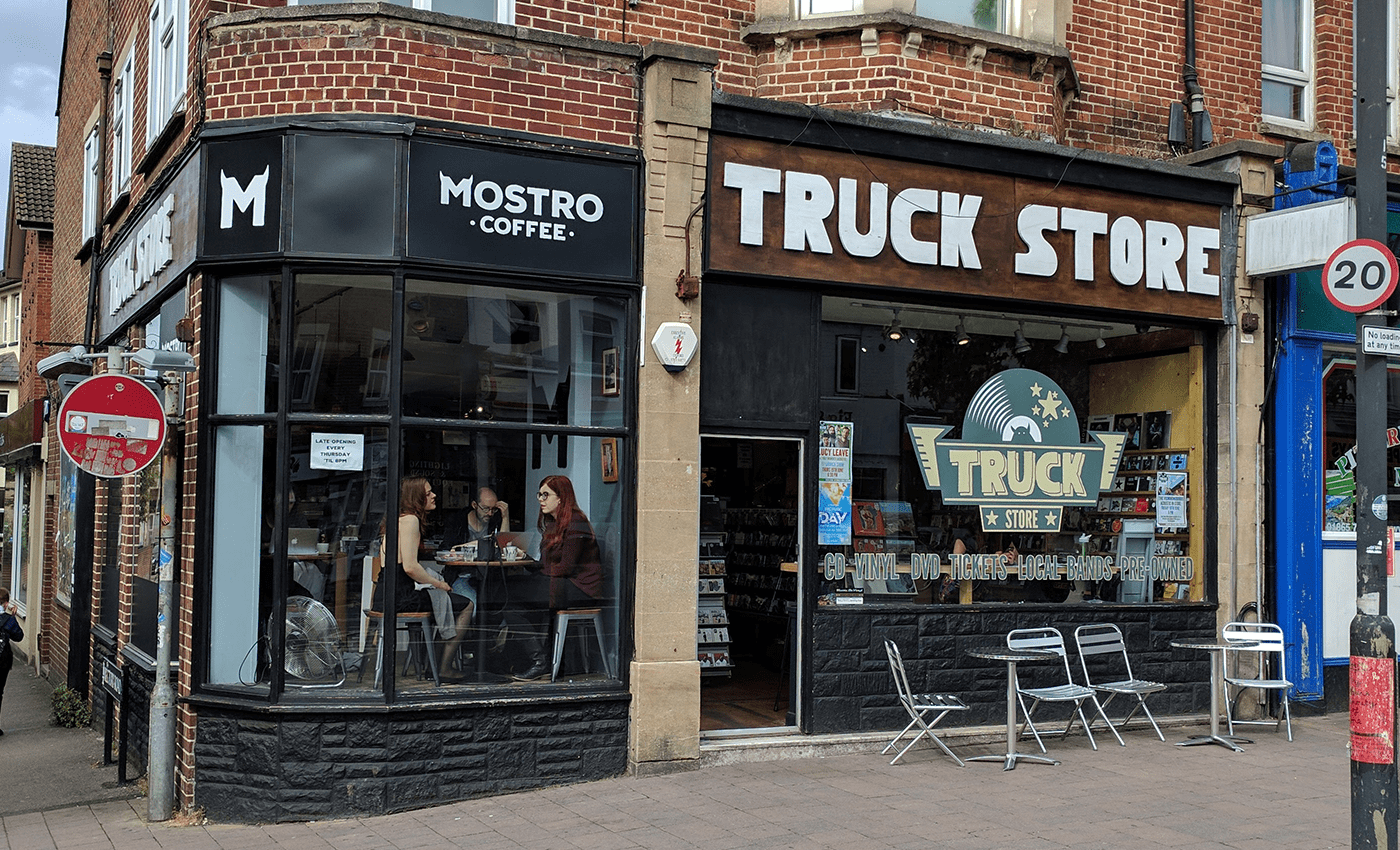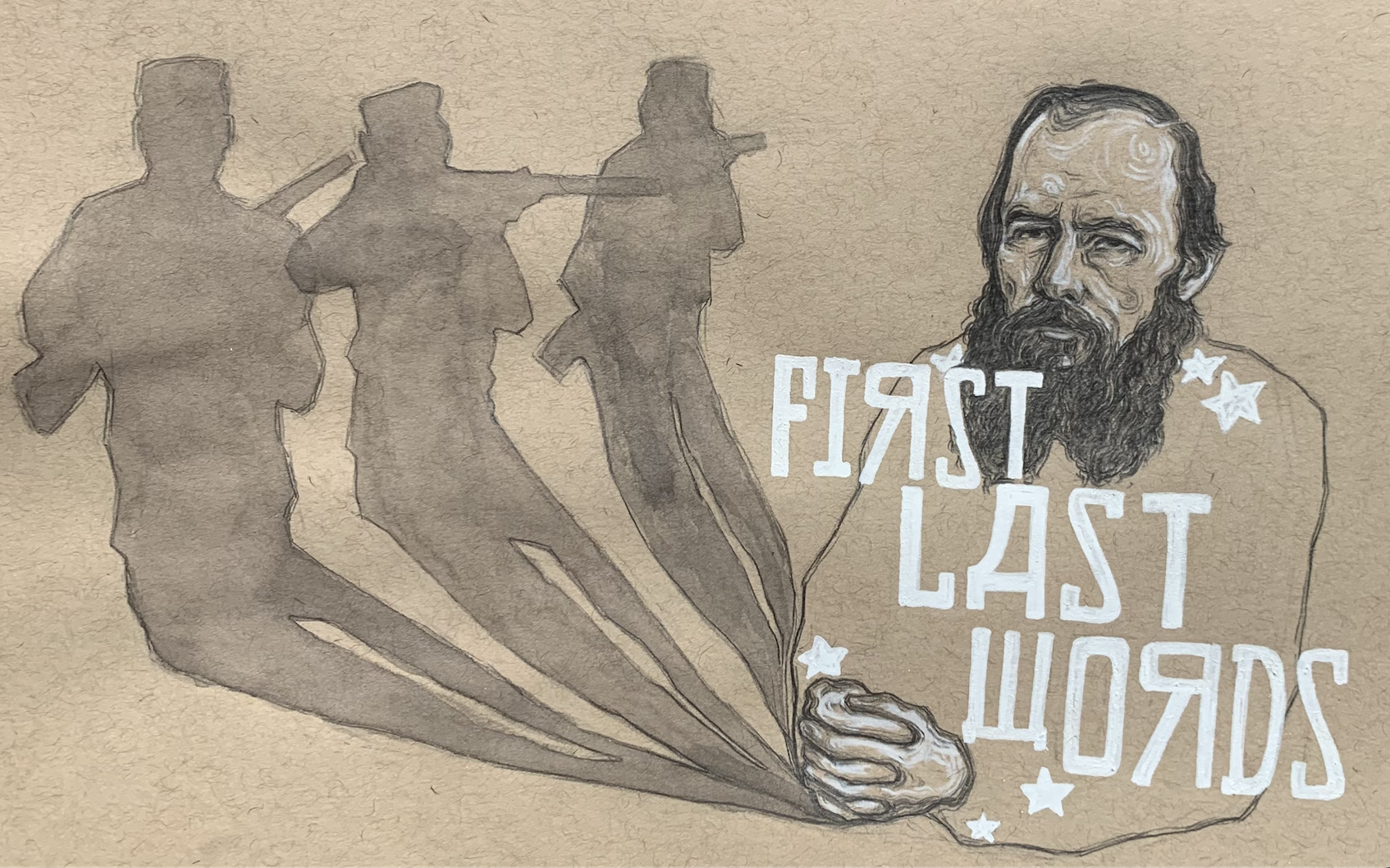
Icon of the Week: Carl Smithson
Flora Bigham speaks to the manager of Truck Records in Cowley, Carl Smithson, about the local music scene, the vinyl revival, and the store’s role in building a community around music in Oxford.
How did you get to this position of running the store?
Our parent company, Rapture opened up a shop in my hometown, so I applied for a job there. I got the job and have basically been doing it ever since. We had shops in Witney, Charlton and Evesham, but not in Oxford. So, in 2011, we teamed up with the people that started Truck Festival. We did a pop-up shop with them in this building. This [building] was an empty video rental shop and was basically just sitting here doing nothing. So, we did a pop up in here initially and then turned it into a permanent thing in 2011 and that’s been here since. That’s kind of the history of how it came to be.
Delving a bit more into your personal history, have records always been a passion?
Shops have always been a big thing for me but I kind of got into vinyl later as CDs were obviously the big thing. Music always informed a lot of my work when I was doing my art degree, so it was always simultaneous. I’ve seen a lot of interesting art projects based around the physicality of records.
How does the music taste in Witney relate to Oxford? Do they each have their own kind of personality?
Both stores have got their own sort of personality but there is also a lot of crossover. A lot of things do well everywhere. Wirh Witney sort of market town with slightly older population, things like kind of Blues and Hard Rock are popular. Whereas Oxford probably does better with electronic, alternative stuff. But most things sell across the board. What’s good is that because we’ve got the two distinct different types of shop, we can cover the more mainstream stuff
Could you say anything about the music taste of Oxford in particular?
It’s hard to say really. It’s so diverse, but there are certain things that we notice that are very much a sort of student taste, but that changes over time. At the moment we’re doing a lot of what we call modern classics, things that are maybe 90s, 2000s onwards. Quite a lot of kind of cult, 90s big albums, that’s all being discovered. The Strokes is a big one, the Fugees also. That’s a generational thing, people rediscovering things.
How do you curate the shop?
It’s based on lots of factors. This shop is very new release based. There tends to be quite a turnover of new albums and then a more selective back catalogue. Things like your Bon Iver and your National and those kind of stalwart indie type bands – we try and keep most of their catalogue in and then focus on new releases each week. In terms of what we take? its changing. You do develop a certain sort of knowledge of what certain customers like. We also get sent streams in advance, so we’ll listen to those. It’s a whole mixture of things, prior knowledge, intuition – and occasionally taking a bit of a gamble. You’ve got to have a fairly broad spectrum, but also because we do a bit of everything, there’s certain things we don’t go too deep into. If something is really ‘out there’, avant-garde jazz or reissues of really obscure albums, we think, maybe that’s not for us.
Are you trying to create more than a shop but a community – with the links to Truck Festival and the coffee shop?
That’s what we’ve always aimed for. Sometimes if you go into quite a small indie shop and it’s just the proprietor out there and it’s just you and them it’s a bit awkward, but with the coffee bar there’s always a bit of bustle around. And a lot of the coffee customers come over and ask what we play and that sort of thing. But it also creates an atmosphere, and hopefully a welcoming environment. That’s the aim. It’s intrinsically linked, and it’s called Mostro because that’s Italian for monster, and our icon is a monster.
How do you choose the music that you play in the shop?
We’re new release driven so especially on a Friday, it’s all new albums. We’ve been working through playing this week’s releases because we want people to come in and say, ‘oh, what’s this? Is this any good?’. We also keep in mind the atmosphere – so we don’t have that much heavy metal. We tend to have more sort of folksy, singer-songwriter stuff in the morning and then build the tempo and the atmosphere up: so in the afternoon it’s the techno bangers. You get a feel for what works too. It could be your favourite album, but if it’s a bit quiet, especially with a bit of chatter, it doesn’t really work. You’ve got to develop a certain skill. Quite often I’ll try something on a Friday and then think, oh wait, this is good shop play album. Then I’ll send a little memo around to everyone saying ‘check this out!’
Doing live shows and other stuff in the shop, that’s also part of the community aspect?
Of course. A newish thing we’re doing is album-launch events. For Lana Del Rey’s new album we streamed it about a week before it was released and we had some posters and freebies, so we had loads of people come in. When the new Queens of the Stone Age album came out, we did a midnight opening and we had lots of freebies to give away with that and competitions – just anything to get people engaged, really. Then you’ve got the live side of it as well. We’ve had the stages built into the shop from day one and we’ve had literally hundreds and hundreds of acts play, from local unsigned acts right up to Mercury Prize-winning acts like Michael Kiwanuka, Gaz Coombes, Glass Animals.
Have you particularly noticed the onset of the ‘vinyl revival’ or has it been more of a gradual change, or perhaps no change at all?
I mean it depends on different kinds of shops. It’s probably different even between Oxford and Witney. We always had some vinyl [in Witney], but not a massive amount, mostly CDs and DVDs. When we did the pop up here, vinyl was definitely what people were asking for, so vinyl has been what we’ve increased. For us it has been quite a sharp increase The CD has definitely kind of fallen away but people still want something physical. So that’s where vinyl has really taken off. We still support the CD and it’s still, costs wise, you know, it’s good to have a bit of everything. But certainly, I think streaming and vinyl are the two most popular.
Does vinyl interact with streaming, and in what ways?
It is just a part of people’s listening habits now. It does give people access to absolutely everything. The problem with that is if you give someone access to absolutely everything, it’s a lot to take and people tend to panic and just go to what they already know. If you look at the current state of the charts, they’re absolutely clogged up with ‘best of’ albums. The new releases are flying to the top and then drop down rapidly. It suggests that people are just sticking to what they know.
Do you think that when people come into a shop, even though there’s less available than the infinite amount of music online, people are more experimental in their choices, and maybe ask for recommendations? Or has streaming made everyone more entrenched in their musical tastes?
It’s really tricky to say. We get a lot of people coming in asking for things that are just not available. I’ll look up what they asked for, and it’s like a band that have released an album on an independent label in Australia that’s never had a release outside of there. It’s because of streaming someone in Oxford’s got access to that. On that side of things that’s brilliant, because that band are getting exposure, but then it also creates this false idea of availability.
What do you think are the reasons for this vinyl revival?
It’s a number of different things. I’ll just use an example: a few months ago we had two girls in – maybe 11 or 12 year olds – who bought a Taylor Swift CD. One of them said, ‘Have you got a CD player?’ and the other one said, ‘Oh no not yet, this is to go on the shrine’. It’s adorable, but it’s also so indicative of how this thing has changed from being functional to becoming something a kind of memorabilia. It’s a way of connecting, and there’s this collectability aspect of it. Even the nature of playing a record, taking time out, the ritual of putting it on, flipping to the other side. Vinyl isn’t going to go away, and more people are discovering it. I think it’s because you’re forced to take a bit of a pause, and can’t just doom-scroll, that you actually engage with the album. Anything that gives people pause in the rush of modern life is a good thing.
Record shops can be an invaluable way to learn something about a city, how do you think Truck represents Oxford?
Every city should have a good record shop. Obviously, Oxford’s produced a lit of huge bands for a smaller city: Radiohead, Supergrass, Glass Animals, Stornoway. In terms of Glass Animals – we’ve done something with them every time they release an album. That engagement with the local scene, and how big it is, that’s important. A lot of people, usually music lovers, will seek out a record shop wherever they are.
A final question, what have you been listening to recently that you would recommend?
We’ve just been doing our albums of the year list, which we’re going to publish soon, so I can’t reveal that just yet. But the most recent act that everyone here has gone mad for is Barry Can’t Swim. ‘When Will We Land?’ was our album of the week last week. He’s a Scottish dance producer and makes this euphoric music. You come in here about five o’clock and that’s what we’ll be playing – he’s our current crush, so to speak.
Words by Flora Bigham.
Image by Independent Oxford.







